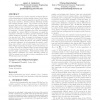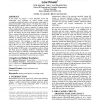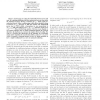201 search results - page 17 / 41 » Evaluating Run-Time Techniques for Leakage Power Reduction |
FPGA
2010
ACM
14 years 4 months ago
2010
ACM
Guarded evaluation is a power reduction technique that involves identifying sub-circuits (within a larger circuit) whose inputs can be held constant (guarded) at specific times d...
SOCC
2008
IEEE
14 years 2 months ago
2008
IEEE
First-in first-out (FIFO) memories are widely used in SoC for data buffering and flow control. In this paper, a robust ultra-low power asynchronous FIFO memory is proposed. With s...
DAC
2002
ACM
14 years 8 months ago
2002
ACM
In this paper we propose a novel integrated circuit and architectural level technique to reduce leakage power consumption in high performance cache memories using single Vt (trans...
ASPDAC
2006
ACM
14 years 1 months ago
2006
ACM
- One of the critical issues in MTCMOS design is how to estimate a circuit delay quickly. In this paper, we propose a delay modeling and static timing analysis (STA) methodology ta...
ISCAS
2005
IEEE
14 years 1 months ago
2005
IEEE
— In this paper we explore the relationship between power and area. By exploiting parallelism (and thus using more area) one can reduce the switching frequency allowing a reducti...



